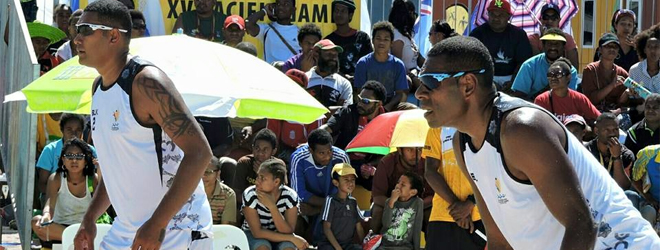For three days last week I was at something that felt remarkably like a UK workshop on accreditation in higher education. I wasn't in the UK for sure. It was being held at our wonderful Mission Centre (a Conference Centre by any other name) at the other end of the campus where meals are served overlooking the ocean and guests are looked after professionally and lovingly, thanks to Eta, Seru, Kasa, Raymond, Seini and the team. So I wasn't back in Croydon (no disrespect to Croydon...) but could have been, if the material under discussion and the language used to handle it was anything to go by.
The issue at stake was how to ensure that places offering Theological Education across the Pacific comply* with quality* assurance* frameworks* nationally and regionally. (Spot the jargon *s) So for us, that's the Fiji Higher Education Council requirements (FHEC) and those of the Pacific Qualifications Framework (PQF). We did lots of spouting in initials.
The body that's supposed to keep a handle on all this, with a 90 page working document of guidelines to prove it, is SPATS...
...no no - nothing like that. SPATS is the South Pacific Association of Theological Schools whose constituency looks like this.
List of Member Schools
- Banmatmat Bible College, Vanuatu
- Bishop Patteson Theological College, Solomon Islands
- Ecole Pastorale de Bethanie, New Caledonia
- Ecole Pastorale de Hermon, Tahiti
- Fiji Bible College of Evangelism, Fiji
- Fulton College, Fiji
- Kanana Fou Theological Seminary, American Samoa
- Malua TheologicalCollege, Samoa
- Marshalls Theological College, Marshall Islands
- Methodist Davuilevu Theological College, Fiji
- Methodist Deaconess Training Centre, Fiji
- Moamoa Theological College, Samoa
- Pacific Regional Seminary, Fiji
- Pacific Theological College, Fiji
- Piula Theological College, Samoa
- Seghe Theological Seminary, Solomon Islands
- Sia’atoutai Theological College, Tonga
- St John the Baptist Theological College, Fiji
- St Athanasius Coptic Orthodox Theological College, Fiji
- South Pacific Nazarene Theological College, Fiji
- Takamoa Theological College, Cook Islands
- Talua Ministry Training Centre, Vanuatu
- Tangintebu Theological College, Kiribati
- University of Auckland School of Theology, New Zealand
- United Theological College, Australia
Now it's a great and Godly thing to be working on 'quality assurance' across the board in Theological Education and I'm personally all for it. God's worth it and so are our Churches and Schools. Those who've been working on the finer details of the SPATS guidelines deserve rapturous applause and extra coconut cake for a start. What a job! So there was much in the workshop that was praiseworthy and encouraging.
But... and it IS a sizeable but. What's really, really tricky and frustrating and gets the teeth grinding for me is that because such large chunks of the standards and guidelines originate in non-Pacific contexts - the UK is dominant, but Australia and New Zealand are up there too - and are worked on in English medium, they just don't take root in natural soil somehow. There's real discomfort and dissatisfaction.
A professional theological educator who knows the Pacific well began by presenting on the topic of quality assurance and the kind of 'product' theological schools should be turning out. The right kind of minister, primarily. 'We all know what quality is when we see it', he said cheerfully. 'We can look at it and see the evidence that standards have been met'.
Mmm - well, we kind of know what you mean, but is there really consensus around something as slippery as quality? Does it translate into the Pacific context with the same assumptions and meaning as there might be in the UK? Is there a 'dynamic equivalent' (we like that term in mission studies!) which the Pacific recognises?
Musing further on the translation aspects of it all, we open up a whole new can of tuna fish linguistically. How do you translate 'critical, reflective practitioner' into Samoan, Tuvaluan or Fijian, if you please?
In the lunch queue, I asked a Fijian colleague teaching at the Methodist College not far away how you translated 'quality' or 'standard' in i-Taukei Fijian. 'It depends what you're talking about', he replied, searching mentally for examples. 'If it's the quality of food - like meat from the lovo (earth oven) that would be a completely different thing from the quality of someone's essay, or indeed the quality of someone's life - like who a 'good' (quality) minister might be'.
Fortunately, it was then indeed time to enjoy some 'quality' local lunch fare from the Mission Centre kitchen....
 |
| My recent veg shopping from Suva market including fab local cauli! |
Theological Education by Extension won't escape the rigours of new accreditation processes either, but perhaps we'll excel on enthusiasm. A few weeks back we did a workshop in Labasa and some assignments are now coming in on the back of that from students - average congregation members - having a go at a Certificate (entry) level Introduction to Biblical Studies course. I enjoyed the spirited writing in these!
Let's read the Bible and go 'Wow - my my my!!' more often eh? Then more wows urged on with highlighter pens...
The author had written on the assignment's cover sheet...
And a timely reminder that I should similarly learn to discipline myself, even though I'm a Methodist Mission Partner. Might you add your own personal sentence at this point?
And then, blissfully distant from the world of accreditation and assignments, a baby was born. Crystal Valerie (oh yes!) Tuilomani Kalouniviti made her entrance on 26th July to the absolute joy of her parents Lome and Koli. She is my namesake - yaca (pronounced yatha) and what a delight and honour that is. God Bless her and her wonderful parents as their new family takes shape.
Allow me to introduce you: on the day we first met, and then all dressed up and raring to go home from hospital.
Thanks be to God for baby Crystal - so sparkling, precious and new.


















